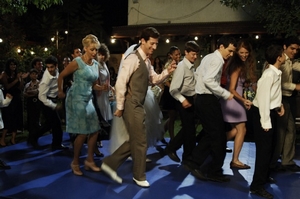Mark:
Erez (Michael Moshonov) and Ofer (Oshri Cohen) are twin boys just reaching maturity in the Israel of the early 1980s. Erez hopes to make films after completing his national service, while Ofer has been aiming to be an elite commando in the Israel Defense Forces for as long as their family can remember. Their summer holiday is filled with dances, flirting, pranks, and ‘The Lost Islands’ – the ever-present Australian television series shown on high-rotation on Israeli television. When a gorgeous new girl arrives at their school, however, the relationship between Erez and Ofer will be brought close to breaking point.
Lost Islands is an ambitious film, attempting to evoke recent Israeli history in a family setting with a complicated interpersonal dynamic, and for the most part succeeding. Period films set within around one generation from the present are often harder to adequately realise than those that reach further into history, and yet Reshef Levy has created a believable and seemingly authentic early-80s Israel. It is probably the music that best places the film in its time, although television, costume and hairstyling also contribute to a convincing overall milieu.
Period films set within around one generation from the present are often harder to adequately realise than those that reach further into history, and yet Reshef Levy has created a believable and seemingly authentic early-80s Israel. It is probably the music that best places the film in its time, although television, costume and hairstyling also contribute to a convincing overall milieu.
Exploring the effect that hidden secrets can have on those who love one another, Lost Islands becomes quite moving in its latter stages – particularly in its depiction of the relationship between Erez and his father (Shmil Ben Ari). There is a remarkable quality to both of these actors, and they generate an authentic and touching relationship in spite of the trauma they suffer. Moshonov shares similar chemistry with Yuval Scharf in the role of Neta, whose romantic interest in Ofer is never meant to be accepted.
Perhaps the most successful aspect of the film is its exposure of the family that lies beneath the surface. Commencing with what could be perceived as an ‘ideal family’ and exploring the effects of tragedy, illness and death, Lost Islands frequently reveals the strengths and weaknesses of the family model. If this is the ‘real family’ hidden beneath the dancing and sing-alongs, how would our own families be perceived?
Lost Islands has flaws: it moves a little slowly at times, while at others jumping forward when I wished for it to linger. Additionally, the character of the mother is a little hard to come to terms with, although she is perhaps marginally more accessible in the last scenes of the film. Further, there are several cinematic cliches that are mined for all they are worth. Finally, as with many films and particularly television series (‘Home and Away’ is a brilliant example – how can so many bad things happen in one tiny beachside town?), it is frequently hard to accept so much tragedy and conflict can occur in one family.
These minor problems aside, Lost Islands is a coherent and moving portrayal of the move from adolescence into adulthood, and the things left unspoken that both bind and erode a family. Recommended.
Rating: